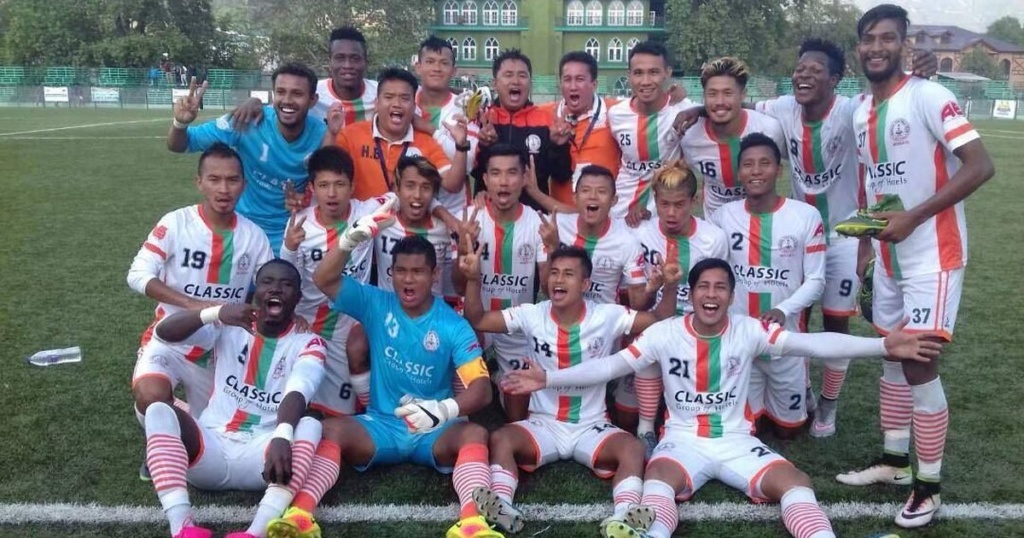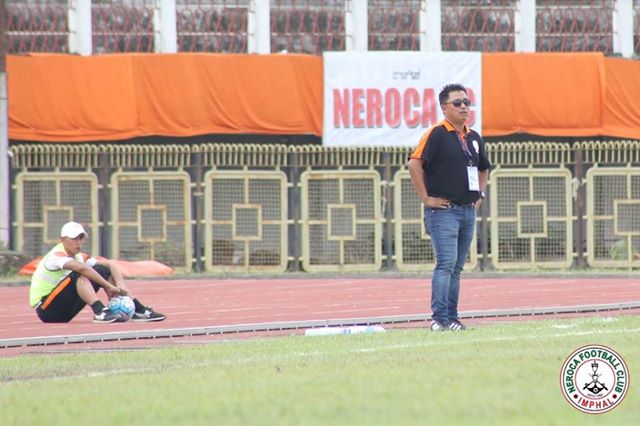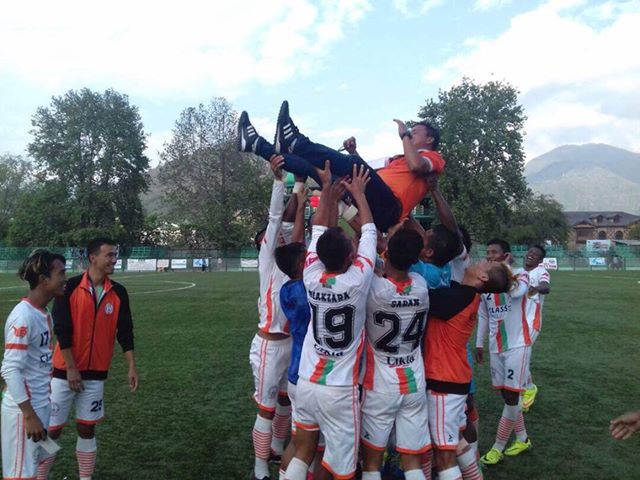The Manipuri outfit has battled the odds to leave a mark on Indian football

First published:
https://scroll.in/field/838543/how-neroca-fc-fought-blockades-in-manipur-to-break-into-the-top-division-of-the-i-league
How Neroca FC fought blockades in Manipur to break into the top division of the I-League
Around two years ago, the people of Manipur started dreaming. For the first time in their football history, a team from the state, Neroca, was gunning for the I-League. When the Imphal-based club whipped Lonestar Kashmir 4-1 on Monday in the final round of the I-League second division, that dream turned into reality, as they qualified for the top flight of Indian football next season.
It wasn’t much of a surprise, given that for years, Manipuri footballers have been a regular feature in various clubs across the country. Yet in all these years, there was not a single team at the national club level representing the state until Neroca made the cut.
Neroca or North Eastern Re-Organising Cultural Organisation was a community-based initiative started in 1965 to get youth involved in sport and extracurricular activities. At its heart, quite naturally, was football, which flourishes on the smallest patch of cleared land amid the fields of Manipur’s many towns and villages. When the drive to turn professional arose, the Classic Group of Hotels jumped on as a sponsor and took over the daily running of the club. The owner and club president, Thangjam Dhabali Singh is a sports enthusiast; his son Naoba, who is the club CEO, a football fanatic. Their aim was to give the people a team they could back, drawing inspiration from the likes of Shillong Lajong and Aizawl.

The beginning of the dream
For years, Neroca had dominated the Manipur State League; all eyes then were on excelling at the I-League second division qualifiers. One of the first calls the club took was to improve the condition of the Khuman Lampak Stadium in Imphal, which was in shambles at that point. With money on hand, the club brought in head coach Gift Raikhan, an AFC A-license holder who was the deputy at Pune FC. With the short time on hand, Raikhan roped in the experience of seasoned Manipuri campaigners playing outside the state such as Lalit Thapa, Sushil Kumar Singh, Govin Singh and Subash Singh. Thapa, who started his career in goal at Neroca, was handed the captain’s armband.
“We had not spent too much time together and most of the younger guys had no experience of playing outside the state,” Thapa says.
Yet in their debut season, Neroca qualified for the final round of the I-League second division, eventually finishing third behind champions Dempo and current I-League campaigners, Minerva. It was an encouraging result for the newbies and now, Raikhan had enough time to work with the players. He tried to get the best out of his seven-odd, under-25 players and the seasoned heads on the squad. At the 128th edition of the Durand Cup last September, Neroca earned an invitation to play based on the promise they had shown in their I-League 2 campaign. What unfolded was a journey to the final which featured stunning performances against clubs that would feature in the I-League the following season (a draw against Dempo and wins against Aizawl and DSK Shivajians). They eventually finished runners-up to Army Green after a disastrous shootout.

“I think that was the turning point for us. If we could compete against I-League clubs, we were headed in the right direction,” recalled Naoba.
Do or die
In December last year, the club members even picked up the bid document offered by the All India Football Federation for direct entry to the I-League. But the federation was unsure about their finances, and offered the places to Chennai City and Minerva. So it was back to the drawing board in preparation for their second attempt to break into the top division.
“The message going out was simple – this was do-or-die, whatever it took to earn a promotion,” Naoba says.
Training hard was one thing, but time and again, Neroca struggled with their preparations due to the many bandhs that inflict the state time and again. The highway blockade that was imposed by the United Naga Council in November last year hurt them the most. For starters, it was impossible to get hold of the basics such as football equipment and dietary supplements that usually come into the state by road.
Fighting off-the-field challenges
“Planning training was just one part of my job. One fine day, I was told that there was no supply of eggs coming in. So I had sit down and plan another diet for the players and look for alternatives for something as simple as eggs!” Raikhan laughed.
Fuel trucks too never reached the state, as a result of which, the price of the reserves at the local pumps skyrocketed. For instance, a litre of petrol was Rs 250 at one point during the blockade. The team bus soon ran dry, and while their own stock lasted, players made their way to the training round by personal vehicles. When that supply too dried up, they had to move to a smaller ground nearby at times and get there on foot.
“This is a close group of players and if it wasn’t for their cooperation and help, it would have been quite a struggle,” Naoba says.
While the qualifiers started off on a winning note in January – a 1-0 away win against Hindustan FC – a 0-2 loss in the next fixture against veteran campaigners Mohammedan Sporting had them realise the competition on hand.
“That defeat came at the right time, at the start of our campaign. The hit we took was important. To jump higher, one needs to take a step backwards at times,” Raikhan says.
‘This region deserves more attention’
What followed was an unbeaten run that lasted 13 matches, including the previous tie against Lonestar Kashmir, which handed them the title even before their last match against second-placed Southern Samity on Sunday. For the final round, Neroca indulged in the experience of Arata Izumi, Felix Chidi, who finished as their top scorer, Mohammad Ali and Saran Singh – about 90% of the squad still comprised Manipuris.
“The young guys on the team are pure quality. This region deserves more attention when it comes to grooming these youngsters,” says Arata, who has turned out for the national side, in addition to the I-League and the Indian Super League.
“I joined Neroca to explore what football was like in the second division and for the first time, I felt like a part of one, big family. This unit is closely-knit and what unfolded on the field is a direct representation of it,” he says.
For now, a warm welcome awaits the team when they land in Imphal on Wednesday, followed by a bus tour across town celebrating with fans. But given the state of Indian football, an uncertain period will begin there on, rooted in the future of the I-League.
“The way we see it, we’ve qualified for the top division organically. Since there has been no solid decision by the AIFF, we are completely blind about the future,” Naoba says.
Retaining players will be another headache for the club that has functioned on a modest budget so far.
“It’s difficult to compete with the big clubs, especially those in the Indian Super League. It will all boil down to the relationship we share with our players,” Naoba adds.
“Money will come and go, but the passion will never die out. Manipur is fired up at the moment and good things will follow,” Raikhan says.
The sports minister of Manipur, Letpao Haokip, has promised a new pitch and floodlights at the Khuman Lampak in preparation for their I-League debut, which will allow Neroca to focus on other things. And perhaps another dream of some day becoming champions of India.